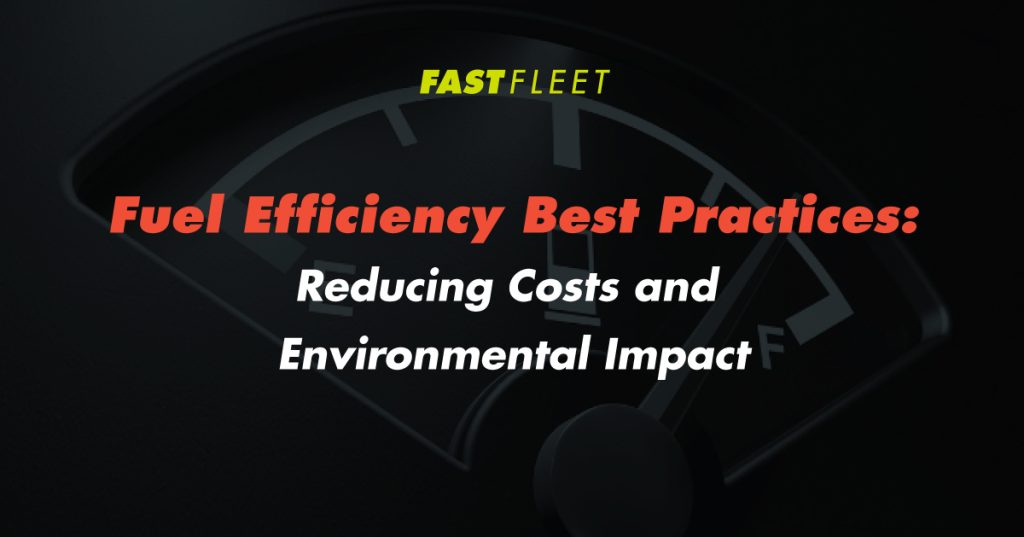Fuel Efficiency Best Practices: Reducing Costs and Environmental Impact
In the world of commercial fleet management, fuel efficiency is more than just a buzzword—it’s a critical factor that can significantly impact a company’s bottom line.
By adopting fuel efficiency best practices, fleet managers can reduce operational costs and minimize their environmental footprint.
In this blog, we’ll delve into practical tips and strategies that can help you optimize fuel efficiency in your commercial fleet.
Regular Vehicle Maintenance
One of the foundational pillars of fuel efficiency is regular vehicle maintenance. Fleet managers should emphasize the importance of routine checks and servicing.
Well-maintained vehicles operate more efficiently, ensuring that engines are running smoothly and consuming fuel optimally.
A properly maintained vehicle can be a key player in your efforts to reduce fuel consumption and costs.
Efficient Driving Habits
Behind the wheel, drivers play a pivotal role in fuel efficiency. Training drivers to adopt fuel-efficient driving habits can yield substantial benefits.
Encourage your drivers to avoid aggressive acceleration and braking.
Smooth acceleration and deceleration not only conserve fuel but also extend the lifespan of your vehicles.
Maintaining a consistent speed on the highway and avoiding unnecessary speed fluctuations can also help conserve fuel.
Additionally, drivers should be educated on the drawbacks of idling. Excessive idling consumes fuel unnecessarily.
Equip your fleet with idle-reduction technologies and encourage drivers to turn off the engine during extended stops.
Proper Route Planning
Efficient route planning can make a world of difference in fuel consumption. Consider utilizing GPS and telematics systems to optimize routes and avoid traffic congestion.
By carefully planning your routes, you can reduce idling time, minimize mileage, and ensure your fleet operates as efficiently as possible.
Fuel-Efficient Technologies
Modern technology offers a range of solutions to boost fuel efficiency.
From aerodynamic enhancements to fuel-efficient tires, these innovations are designed to reduce fuel consumption.
Aerodynamic improvements can streamline your vehicles, reducing drag and improving fuel economy.
Fuel-efficient tires are designed to minimize rolling resistance, ensuring that your fleet runs efficiently.
Monitoring and Data Analysis
Fuel efficiency is not a one-size-fits-all endeavor. Monitoring fuel consumption and collecting data are crucial steps in the process.
Utilizing telematics systems, you can gather valuable insights into how your fleet operates.
Real-time data analysis can reveal areas where improvements can be made.
By continuously fine-tuning your fuel efficiency strategies based on data, you can optimize your fleet’s performance.
Driver Training Programs
Investing in driver training programs focused on fuel efficiency can have a substantial impact.
These programs raise awareness among your drivers about the importance of fuel efficiency and provide them with the tools and knowledge they need to drive efficiently.
Ongoing training ensures that your drivers stay up-to-date with the latest fuel-efficient driving techniques.
Environmental Benefits
While cost savings are a significant motivator, it’s essential to highlight the environmental benefits of fuel efficiency.
Reduced fuel consumption leads to lower emissions, contributing to a greener and more sustainable operation.
Promoting your commitment to environmental responsibility can also enhance your company’s image and reputation.
Incorporating fuel efficiency best practices into your fleet management strategy can lead to significant cost reductions and a reduced environmental footprint.
Regular maintenance, efficient driving habits, proper route planning, the adoption of fuel-efficient technologies, data analysis, and driver training programs are all key components of a successful fuel efficiency strategy.
By implementing these practices, your fleet can run more efficiently, reduce costs, and contribute to a cleaner environment.
At Fast Fleet, we understand the importance of addressing your emergency road needs promptly and efficiently.
Our team of experienced technicians is dedicated to providing best-in-class roadside and maintenance mechanical services.
Whether you’re facing engine trouble, suspension issues, or any other emergency, you can trust Fast Fleet to get your truck back on the road swiftly and in top condition.
Contact us today for reliable roadside assistance and maintenance services that you can count on.
















